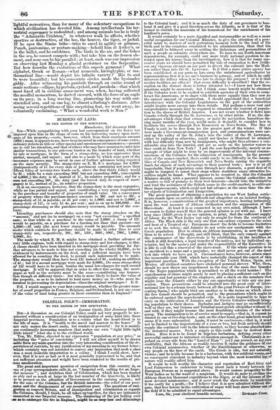BURDENS ON LAND.
TO THE EDITOR OF VIE SPECTATOR.
Manchester, 22d January 1850. smpathszusg with your last correspondent on the heavy tax
AL imposed upon him in the shape of costs on his borrowing money upon mort- is' - gage of his property,—costs, however' which from their enormous amount (2001.) must, it appears to me, have been incurred in consequence of some extra- ordinary defects in title or other special and uncommon eircumstances,—permit me to call his attention, and that °tethers who may have occasion to enter into similar transactions, to one grievous burden on the transfer of land, whether by sale or mortgage, in the form of a stamp-duty, no less oppressive than partial, unequal, and unjust ; and also to a mode 'by which some part of the necessary expenses may be saved in case of further advances being required on the same security. The stamp-duty on E. M. S.'s mortgage for 4,000/. independently of 11.. for every skin of parchment containing not more than flfteen folios of seventy-two words each, above the first thirty folios) would be 8/. while for a sum exceeding 300/. but not exceeding 500/., (one-eighth of 4,0601„) the duty is 4/., instead of 1/., its relative proportion; and for a sum not exceeding 60/., the duty (and the lowest duty in respect of mort- gages) is 11., instead of 28., its relative proportion. Itis on conveyances' however, that the stamp-duty is the most expensive, while no less partial and unjust, and constituting a -very great impediment to the purchase and transfer of properties of small value. On a conveyance of property where the purchase-money amounts to 20/. and not to 501., a ,stamp-duty of 11. is payable, or 51. per cent; to 1,000/. and not to 2,0001, a stamp-duty of 121., or only 11. 48. per cant; and so on up to 100,0001.: the percentage decreasing as the purchase-money increases, instead of the con- trary.
Intending purchasers should also note that the stamp attaches on the "amount," and not (as in mortgage) on a sum "not exceeding" a specified MEI; 80 that while on is purchase to the value of 2,000/. a stamp of 12/. would be payable on a purchase for a fraction km than that amount—say
1,999/.-91. only payable, next lower stamp) would be payable. The amounts snider which contracts for purchase should be made in order thus to save stamp-duty are, respectively, 201., 50/., 150/.2 3001., 500/., 7001., 1,0001., 2,000/., &c.
The mode by which E. 11. S. might have obtained a further advance at very little expense, both with regard to stamp-duty and law-charges, is this. A clause should have been inserted in his mortgage-deed providing for fur- ther advances to be made to him not exceeding (in the whole) 10,0001., to be evidenced by indorsements on the deed, and a sufficient margin have been allowed for in counting the deed, to permit such indorsement to be made. The stamp-duty would then have been 12/. instead of 8/., making an addition of 41.; but if a second mortgage were made for 8,0001., the same stamp-duty of 12/. would have to be paid, besides the usual law-charges for such stmond mortgage. It will be apparent that in order to effect this saving, the mort- gagee as well as the security must be the 8ame—constitutuig one transac- tion though at different times : but who is more likely to know the value of the property, so as to be induced to lend more money on it—who more in- -teted in preventing its depreciation—than the original mortgagee ? E. S. P.S. I would suggest to your first correspondent, whether the greater num- ber of small properties in France, Belgium, and Switzerland, is not one cause of the value of land being greater in those countries than in England?


























 Previous page
Previous page